Contact Us
Battelle Tompkins , Room 137 on a map
History 4400 Massachusetts Avenue NW Washington, DC 20016-8038 United StatesFaculty Bookshelf
Recent books and new works in progress from our faculty—please see Faculty Profile pages for more.
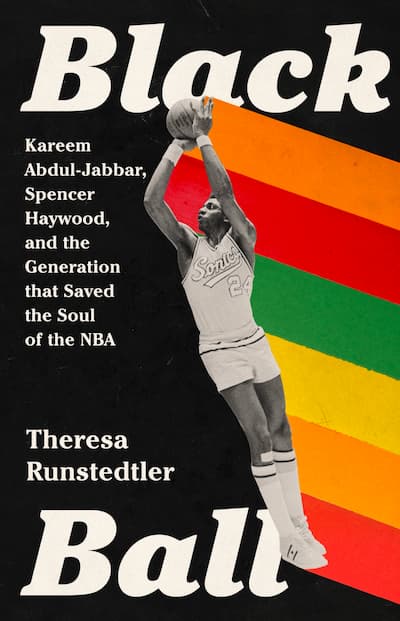
Black Ball: Kareem Abdul-Jabbar, Spencer Haywood, and the Generation That Saved the Soul of the NBA
By Theresa Runstedtler (2023). How Black ballplayers of the 1970s and '80s set the once-troubled NBA up for success. Theresa sheds new light on what she has termed the “dark ages” of the league. She argues that the much-maligned era “when pro basketball was becoming both demographically and stylistically Black” was pivotal to the emergence of the “dazzling, star-laden NBA we know today.”

Three Cities after Hitler: Redemptive Reconstruction across Cold War Borders
By Andrew Demshuk (Pittsburgh, 2021). In West and East Germany, and communist Poland, city planners pursued what Demshuk calls "redemptive reconstruction," a selective mix of modernist architecture and historicist renovation to shape new cityscapes for a new era.
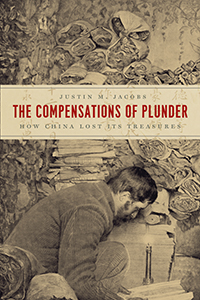
The Compensations of Plunder: How China Lost Its Treasures
By Justin Jacobs (Chicago, 2020). Based on a close analysis of previously neglected archives in English, French, and Chinese, Jacobs finds that many local elites in China acquiesced to the removal of art and antiquities abroad, understanding their trade as currency for a cosmopolitan elite.
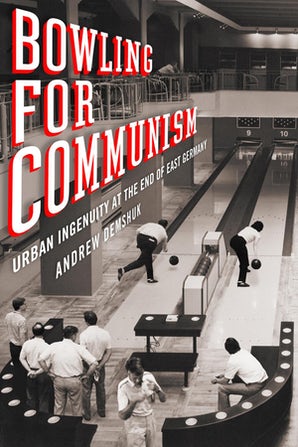
Bowling for Communism:
Urban Ingenuity at the End of East Germany
By Andrew Demshuk (Cornell, 2020). Illuminates civic life in Leipzig, East Germany's second-largest city, on the eve of the 1989 revolution by exploring acts of "urban ingenuity" such as local communist officials who, with the help of scores of volunteers, constructed a palatial bowling alley without Berlin's knowledge or approval. Hardly detached or inept, local officials worked around centralized failings to build a more humane city.
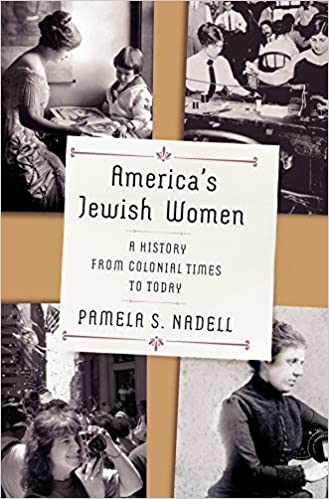
America's Jewish Women: A History from Colonial Times to Today
By Pamela Nadell (Norton, 2019). Winner of the 2019 National Jewish Book Award. “America’s Jewish Women is a thoughtful history of a group of diverse, passionate, contemplative, vocal and dynamic women, and is a welcome addition to the American historical canon” (New York Times.)
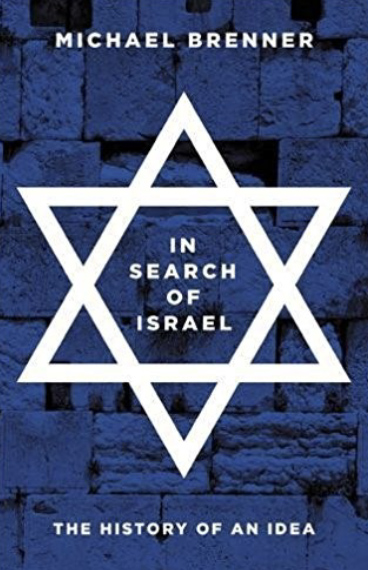
In Search of Israel:
The History of an Idea
By Michael Brenner (Princeton, 2018). Finalist for the 2018 National Jewish Book Award in History. "A rare history that compels the reader to think constantly about the present and even about the future" (David K. Shipler, Moment).
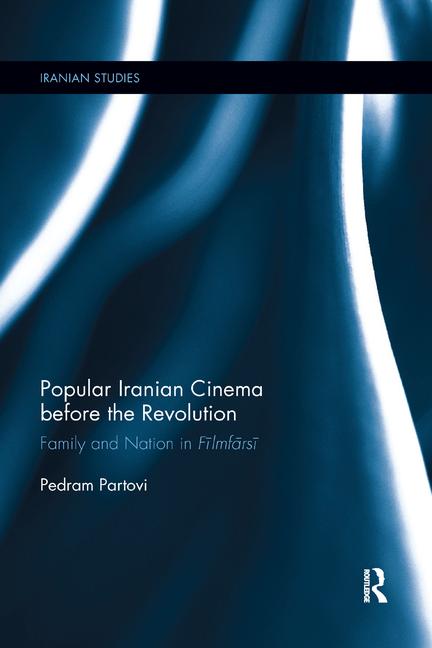
Popular Iranian Cinema before the Revolution: Family and Nation in Fīlmfārsī
By Pedram Partovi (Routledge, 2017). "Partovi suggests that films can constitute and shape the world, not merely chase after the wake in order to represent it....Even in their exaggerations, excesses, and melodrama, these films ... are rich sources for understanding the complex desires, anxieties, and social negotiations of Iranians in the mid-century"(Journal of Religion and Film).
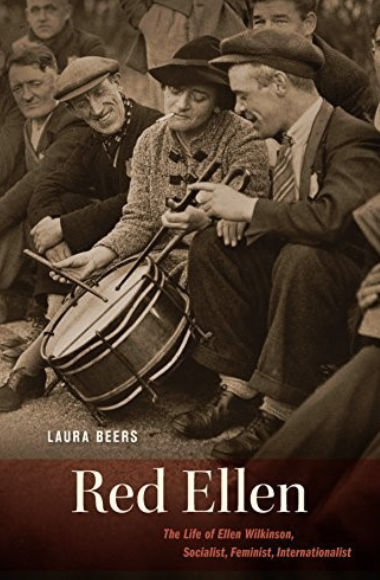
Red Ellen: The Life of Ellen Wilkinson, Socialist, Feminist, Internationalist
By Laura Beers (Harvard, 2016). Wilkinson is best remembered as the leader of the Jarrow Crusade, the 300-mile march of two hundred unemployed shipwrights and steelworkers to petition the British government for assistance. But this was just one small part of Red Ellen’s larger transnational fight for social justice. “Gives readers a vivid insight into the life of one of the most important figures in the history of the British radical left,” (Katherine Williams, LSE Review of Books).
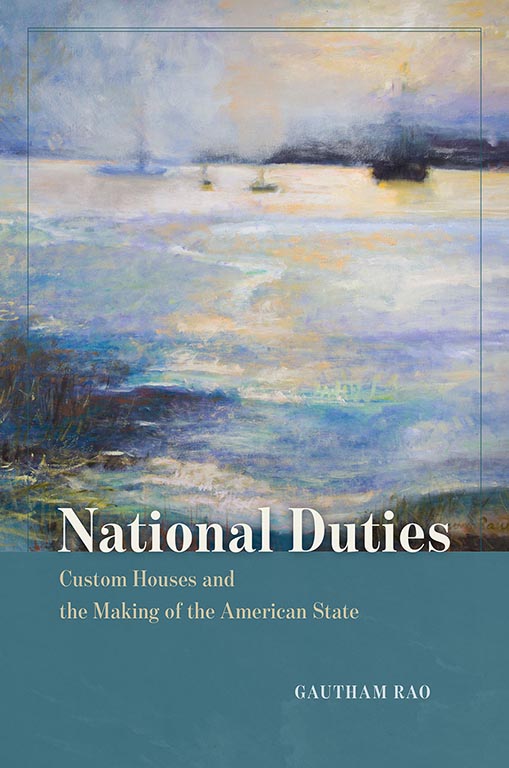
National Duties: Custom Houses and the Making of the Amercan State
By Gautham Rao (Chicago, 2016). “Brilliantly researched and smartly argued, National Duties deploys prodigious research to construct a social history of governance in the early Republic....Rao’s approach yields a major substantive payoff. He argues persuasively that the great centralizer, Alexander Hamilton, was in fact instrumental in replicating a decentralized financial regime and it was Jefferson and Madison, so often portrayed as the protectors of state’s rights who shored up the plenary power of the national government" (Brian Balogh, University of Virginia).
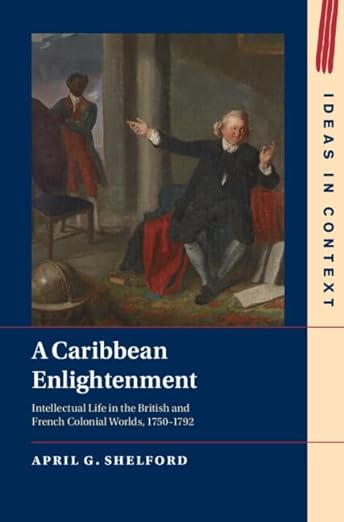
A Caribbean Enlightenment: Intellectual Life in the British and French Colonial Worlds, 1750–1792
By Prof. Emerita April Shelford. A Caribbean Enlightenment (Cambridge, 2023) recovers a neglected aspect of the region’s history by exploring the intersection of Enlightenment ideas and colonial realities among White, male colonists in the eighteenth-century French and British Caribbean. Shelford ultimately argues that becoming “enlightened” was a colonial identity that pushed back against metropolitan stereotypes of Caribbean degeneracy while attempting to validate the power to enslave on a cultural basis.
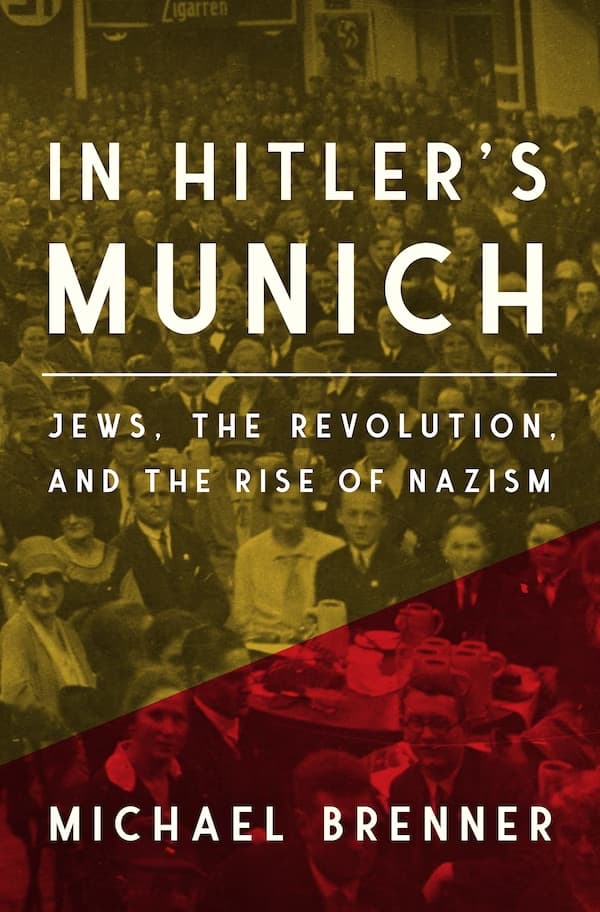
In Hitler's Munich: Jews, the Revolution, and the Rise of Nazism
By Michael Brenner (Princeton, 2022). From acclaimed historian Michael Brenner, a mesmerizing portrait of Munich in the early years of Hitler's quest for power.
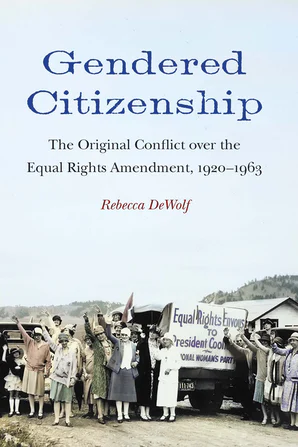
Gendered Citizenship: The Original Conflict over the Equal Rights Amendment, 1920–1963
By Rebecca DeWolf (Lincoln, 2021). By engaging deeply with American legal and political history as well as the increasingly rich material on gender history, Gendered Citizenship illuminates the ideological contours of the original struggle over the Equal Rights Amendment (ERA) from 1920 to 1963.
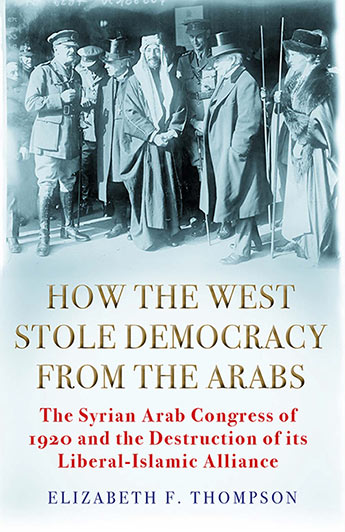
How the West Stole Democracy from the Arabs
By Elizabeth F. Thompson (Grove, 2020). “In a book sure to interest students of Middle Eastern history, particularly in the 20th century, Thompson fashions an original, authoritative study, laying out the process of the ‘theft’ of Syrian democracy” (Kirkus Reviews).
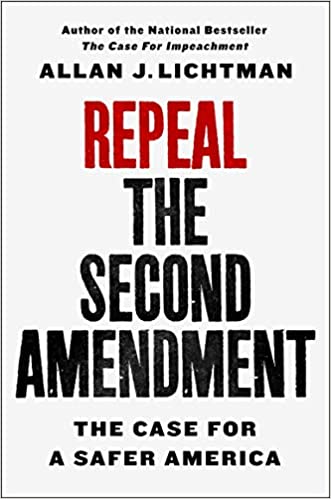
Repeal the Second Amendment: The Case for a Safer America
By Allan Lichtman (St. Martin's, 2020). Explores both the true history and current interpretation of the Second Amendment to expose the NRA’s blatant historical manipulations and irresponsible fake news releases. Lichtman looks at the history of firearms and gun regulations from colonial times to the present to explain how a historically forgotten sentence in the Constitution has become a flash point.
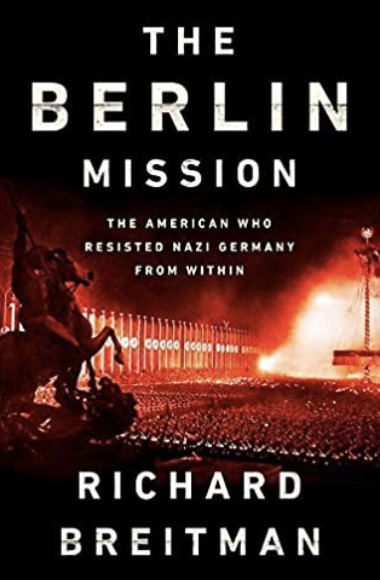
The Berlin Mission:
The American Who Resisted Nazi Germany from Within
By Richard Breitman (Hachette, 2019). While US ambassadors and consuls general cycled in and out, the indispensable Geist remained in Berlin for a decade. An invaluable analyst and problem solver, he was the first American official to warn explicitly that what lay ahead for Germany’s Jews was what would become known as the Holocaust.
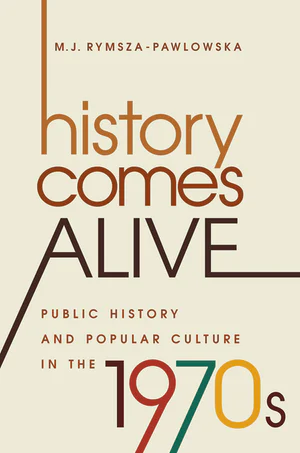
History Comes Alive:
Public History and Popular Culture in the 1970s
By M.J. Rymsza-Pawlowska (UNC, 2017). For the majority of the twentieth century, Americans thought of the past as foundational to, but separate from, the present, and they learned and thought about history in informational terms. But Rymsza-Pawlowska argues that the popular culture of the 1970s reflected an emerging desire to engage and enact the past on a more emotional level.
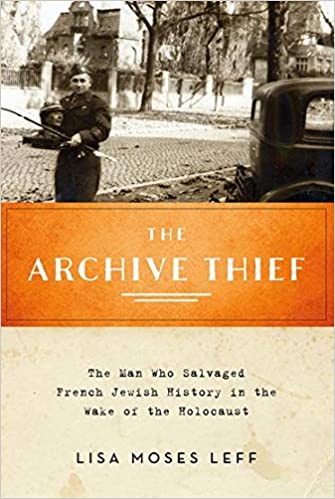
The Archive Thief: The Man Who Salvaged French Jewish History in the Wake of the Holocaust
By Lisa Leff (Oxford, 2015). 2016 Sami Rohr Prize Winner. "How the chaos, needs, and rivalries of post-Second World War Jewish collectors and institutions played into [Szajkowski's] hands, is the subject of Leff's engrossing and painstakingly documented book. Her research was made all the more demanding by the fact that there is no way of knowing all that is actually missing from collections. It is the wider context of her book that is so fascinating, for it raises important questions about the very nature of archives themselves, particularly what she calls 'archives of catastrophe'" (Times Literary Supplement).
More Faculty Books
Selected notable works from previous years:
- Laura Beers, Your Britain: Media and the Making of the Labour Party
“This is a very original and important book. Beers argues strongly against the conventional view that the Labour Party was reluctant to exploit the modern media.... She makes the convincing case that Labour was quick to take up modern media, (...) which was an essential element in the creation of the broad-based democratic electorate that gave the Party victory in 1945.” —Ross McKibbin, University of Oxford - Michael Brenner, Prophets of the Past: Interpreters of Jewish History
In its scope it is unprecedented. Brenner has made a stellar contribution to Jewish intellectual history that should be of equal interest to all who would explore the nexus between historiography and ideology."—Yosef Hayim Yerushalmi, Columbia University - Andrew Demshuk, Demolition on Karl Marx Square: Cultural Barbarism and the People's State in 1968
Demshuk's book suggests that histories of urban space and public monuments should be more central to our understanding of a society at a particular historical moment, as they—when treated rigorously—have the potential to concatenate all of the complex social, political, and economic forces that impinged on people's lives into a cogent and compelling portrait.—Samuel L. Sadow, American University - Anton Fedyashin, Liberals under Autocracy: Modernization and Civil Society in Russia, 1866–1904
“An original and valuable contribution to illuminating another of those groups in imperial Russia who lost out in the game of history, but whose legacy is strikingly apropos at present in Russia’s shaky democracy. A major contribution.”—Richard Stites, Georgetown University - Eileen Findlay, Imposing Decency: The Politics of Sexuality and Race in Puerto Rico, 1870–1920
“[A] welcome addition to the emerging field of gender studies in Latin American societies and to the recent studies challenging the presentation of these societies as racial democracies. . . . Findlay has produced a challenging work on the moral values and struggles of working women and men.” —Aline Helg, American Historical Review - Max Paul Friedman, Rethinking Anti-Americanism: The History of an Exceptional Concept in American Foreign Relations
"Highly original, and excellent, investigation of anti-Americanism cast in a brand new light … This remarkable book, fluidly written and very enjoyable to read, is based on thorough historical research in United States, Latin American, and Western European archives."—Sophie Meunier, Political Science Quarterly - Mary Frances Giandrea, Episcopal Culture in Late Anglo-Saxon England
There is much to be grateful for here.... An accessible synthesis of material not easily available and provides the first systematic, wider conclusions from those studies.( .English Historical Reiiew) - Kate Haulman, The Politics of Fashion in Eighteenth-Century America
"Haulman's terrific examination of the gendered implications of fashion is magnificently subtle and detailed, particularly as she insists on linking them to political changes over the course of this era . . . important reading for scholars of gender, revolutionary political culture, and early American studies." — Carolyn Eastman, American Historical Review - Dan Kerr, Derelict Paradise: Homelessness and Urban Development in Cleveland, Ohio"
A tightly argued, effectively researched, and well-written book. Kerr successfully brings the voices of the unhoused and unemployed into his story at every turn, making a convincing case for their role in altering, if rarely determining, policy."—Mark E. Santow, coauthor of Social Security and the Middle Class Squeeze - Alan Kraut, Silent Travellers
"Mr. Kraut's narrative shows that it has always been easier to blame immigrants for epidemics than to attack the infrastructure of disease .A troubling theme underlying ilent Travelers is that when shoddy science is married to unenlightened political leadership, bad medical things will happen, and they will almost always happen to the disenfranchised—from the surgical removal of adenoids to disquieting associations made between ethnic origin and mental performance."" (New York Times) - Peter Kuznick (with Oliver Stone), The Untold History of the United States
“As riveting, eye-opening, and thought-provoking as any history book you will ever read...Can’t recommend it highly enough.” —Glenn Greenwald, The Guardian - Lisa Leff, Sacred Bonds of Solidarity: The Rise of Jewish Internationalism in Nineteenth-Century France
"This is the story Lisa Moses Leff has to tell, a story of emancipation and religious fellow feeling, and she tells it with lucidity and a deep sympathy for her subject matter...She has recounted a tale of hope and optimism, of a community energized by the prospect of its own emancipation and mobilized to make its contribution to a France itself in the process of transformation."—Journal of Modern History - Allan Lichtman, The Embattled Vote in America: From the Founding to the Present
“Lichtman’s important book emphasizes the founders’ great blunder: They failed to enshrine a right to vote in the Constitution or the Bill of Rights… The Embattled Vote in America traces the consequences through American history… [Lichtman] uses history to contextualize the fix we’re in today… Growing outrage, he thinks, could ignite demands for change. With luck, this fine history might just help to fan the flame.”—James A. Morone, New York Times Book Review - Allan Lichtman, White Protestant Nation: The Rise of the American Conservative Movement
Finalist for the National Book Critics Circle Award“Allan Lichtman’s new book breaks important ground. Based on an extraordinary range of archival sources, he reminds us that conservatism is not the recent product of Ronald Reagan or Karl Rove, but is deeply embedded in more than a century of American politics and culture.” —Robert Griffith - Eric Lohr, Russian Citizenship: From Empire to Soviet Union
“An extremely rich and thought-provoking book. Lohr’s work will have a powerful impact upon the field of Russian history, and its arguments will feed into broader debates about citizenship, globalization, and the way in which Russian conceptions of membership in the state were or were not similar to those found across Europe. To my mind, Russian Citizenship is unique: there is nothing like it any language.”—Dominic Lieven, London School of Economics - Eric Lohr, Nationalizing the Russian Empire: The Campaign against Enemy Aliens during World War I
“Lohr has mined unique and wide-ranging materials to make this invaluable contribution to one of the most crucial and unexplored periods of modern Russian history—the transformation of the Russian Empire into a modern nation.”—A.V. Isaenko, Choice - Pamela Nadell, Women Who Would Be Rabbis: A History of Women’s Ordination, 1889-1985
"In a lucid, accessible book on the long struggle for women's ordination to the rabbinate, Nadell brings to life figures, such as Regina Jonas and Ray Frank, who have been obscured by accounts that began with the 1972 ordination of Sally Priesand. Nadell makes clear that that event neither began the history of women's ordination in Judaism nor ended controversy about it. (…) She attends to each strand of US Judaism—Reform, Reconstructionist, Conservative, and Orthodox—and sets her subject in the context of the concurrent US women's rights struggle" (Library Journal). - Theresa Runstedtler, Jack Johnson, Rebel Sojourner: Boxing in the Shadow of the Global Color Line
“Runstedtler presents an unexpected yet wholly authentic take on the great African American boxer, Jack Johnson; namely, that his impact extended beyond the US to such far-flung nations as Australia, South Africa, the Philippines, even India and Sri Lanka, where indigenous dark populations were finding one black man’s success against his white opponents empowering in their own resistance to their dominant white populations.”—Alan Moores, Booklist - April Shelford, Transforming the Republic of Letters: Pierre-Daniel Huet and European Intellectual Life, 1650-1720
Transforming the Republic of Letters is a formidable book about a formidable man: Pierre-Daniel Huet. A deft and vivid narrator, April Shelford recreates Huet's career, his friendships with learned men and women, his projects and his quarrels with erudition, tenacity and deep historical insight.... This finely observed biography is also an original and striking work of cultural history. —Anthony Grafton, Princeton University - Elke Stockreiter, Islamic Law, Gender, and Social Change in Post-Abolition Zanzibar
‘This captivating history establishes that Islamic courts contributed significantly to reconfiguring social relationships in post-abolition Zanzibar. Elke Stockreiter deftly explores rarely studied topics, such as women’s control of property, men’s material gains from divorce, and former slaves’ claims to inheritance, and reveals how the courts enabled these forms of individual agency while also constraining their social impact.’—Susan F. Hirsch, George Mason University - Katharina Vester, A Taste of Power: Food and American Identities
"Through a series of zesty readings, A Taste of Power teaches us how to parse the politics of cooking and eating. A keen cultural analyst, Vester shows how the salt of normativity and the pepper of resistance have infused the recipes we live by and thus every bite we eat.” —Kristin Hoganson
Faculty Updates
Brief notes on faculty work in progress, recent articles, fellowships, and more:
Laura Beers
Professor Beers is currently working on her third book project, on the politics of infertility research and treatment in modern Britain. Earlier this year, she carried out archival research in Britain funded by a research bursary from the Wellcome Trust, and has written on infertility for CNN. Professor Beers has taken a keen interest in the UK’s Brexit drama, writing and speaking on Brexit and British history for the Washington Post, the New Statesman, The Atlantic, CNN and the BBC. She was recently awarded the University’s Morton Bender prize, which acknowledges the extraordinary research achieve-ments of a recently-tenured faculty member. She has published a piece in CNN on the history of the term Orwellian and its relevance to contemporary political debates.
Richard Breitman (Distinguished Professor Emeritus)
Richard Breitman continues to serve as editor of Holocaust and Genocide Studies, a scholarly journal owned by the United States Holocaust Memorial Museum. His book, The Berlin Mission: The American Who Resisted Nazi Germany from Within, was pub-lished by Public Affairs in October.
Michael Brenner
Michael Brenner gave numerous book talks on his In Search of Israel: The History of an Idea (Princeton University, 2019), which will appear in paperback in 2020. Together with the President of Germany, he was the keynote speaker at the anniversary of the College for Jewish Studies in Heidelberg in June 2019. His latest book on the rise of the Nazi Movement in Munich, which appeared in German in 2019, will be published in English by Princeton University Press in 2020. He served as consultant and is featured in a new CNN six-part series on Jerusalem to be screened later this year. He published a scholarly article "The Ever-Dying People? Prophets of Doom and the Survival of European Jewry" in The Future of the German-Jewish Past.
Andrew Demshuk
In addition to publishing Bowling for Communism: Urban Ingenuity at the End of East Germany, Demshuk has forthcoming articles with Contemporary European History, European History Quarterly, and in the edited volume War and the Urban Context (Ferdinand Schöningh Verlag). He attained a residency fellowship for summer research at the Architecture and Planning Institute of former East Germany (Berlin) for June 2020 and AU Mellon Grants (Spring and Fall) to help cover subvention and image rights for Cornell University Press volume.
Anton Fedyashin
Professor Fedyashin was visiting professor at the Moscow State Institute of International Relations (MGIMO) and Minzu University in Beijing, China. He published “Andropov’s Gamble: Samantha Smith and Soviet Soft Power” in The Journal of Russian-American Studies (v. 4, No. 1, May 2020). He continues to publish numerous book reviews and to give numerous interviews on international relations to media outlets in Europe, Russia, China, and the US. He is currently working on his book Superpower Subconscious: The Cold War and the Spy Novel.
Eileen Findlay
Eileen’s article “Cien por Cientos Cubanos: National Identity, Master Narratives, and Si-lencing Moves in a Transnational Caribbean Family History” was approved for publica-tion in the Latin American Research Review. She also delivered a paper at an interna-tional conference on Caribbean History at the University of Wisconsin, Madison. This year, Eileen Findlay also stepped down as the History Department’s Director of Under-graduate Studies and became the Chair of a new interdisciplinary teaching unit—the Critical Race, Gender, and Culture Studies Collaborative. Eileen retains her appointment in the History Department while serving as Chair of the CRGC. She also has begun a 4-year term as the External Examiner for the Women and Gender Studies Programme at The University of Hong Kong.
Max Paul Friedman
Max Paul Friedman published “The Promise of Precommitment in Democracy and Hu-man Rights,” with Tom Long, in Perspectives on Politics (September 2019), and op-eds in The Conversation, Americas Quarterly, La Diaria, and Deutschlandradio Kultur. He wrote and revised “A History of United States Diplomacy,” an 18-panel exhibit for the State Department. He received the Bessel Research Award from the Alexander von Hum-boldt Foundation, worth 40,000 Euros, given to “internationally renowned scientists and scholars [with] outstanding research records.” He was appointed to the editorial board of Diplomatic History and elected to the board of the Association for Diplomatic Studies and Training. He is now serving as interim dean of the College of Arts and Sciences.
Mary Frances Giandrea
Mary Frances Giandrea has been busy on several committees as American University seeks to reconfigure its core curriculum. A key feature of the new vision is to develop stu-dent’s intellectual capabilities, while expanding their perspective and their ways of know-ing a complex world. This year, Dr. Giandrea has been teaching courses on the History of Britain, the Crusades, the Vikings, Medieval Europe, Ancient Greece and Religion and Con-flict in History.
Kate Haulman
Kate Haulman’s co-curated exhibit, “All Work, No Pay: The History of Women’s Invisible Labor,” which opened in 2019 at the National Museum of American History, will run through March of 2021. She consulted on the exhibit “Girlhood: It’s Complicated,” to open in June 2020, and received a grant from the Smithsonian’s Women’s History Initia-tive for the project “In Her Own Words: Audience Centric Metadata for Women’s History Objects,” funds from which supported a student workshop that informed the production of enhanced records for objects in the NMAH’s digital catalog.
Justin Jacobs
Justin Jacobs published his new book, The Compensations of Plunder: How China Lost Its Treasures (University of Chicago Press) in July. He also published "The Concept of the Silk Road in the 19th and 20th Centuries" for the Oxford Research Encyclopedia of Asian History. He is currently working on producing a 24-episode series for The Great Courses titled "World Heritage Sites: Exploring the World's Greatest Places.
Daniel Kerr
Dan Kerr focused much of his attention on the Humanities Truck, which is now moving into its third year of operations. In 2019 the project received a major grant from the Mellon Foundation. The three year grant funds six faculty and six graduate fellowships to work with and use the truck for community engaged projects, a speaker series, a commu-nity advisory board, and an exhibit production workshop. The truck project was as active as ever when it needed to shut down in person events as a result of the pandemic. As a result, Kerr initiated the From Me to You: A Covid-19 Oral History Project. In the summer, the truck resumed operations and worked with community partners to deliver food to people in need. In 2020-21 the truck will focus on the theme of Food and Communities.
Alan Kraut
Alan Kraut chairs the History Advisory Committee of the Statue of Liberty Ellis Island Foundation. They are currently revising the exhibitry in the Ellis Island National Museum of Immigration. He is also the current president of the National Coalition for History, the lobbying group for the nation’s historians and archivists. He has been engaged with the current health crisis and its influence on migration. His article on anti-Asian nativism and the COVID-19 pandemic, “The Other Pandemic,” was published by the History News Net-work in April 2020. He was a panelist on a webinar sponsored by the Migration Policy In-stitute, “Migration & Coronavirus: A Complicated Nexus Between Migration Management and Public Health.” He has also been interviewed on the history of the 1918 Influenza epidemic on National Public Radio, Kojo Nnamdi’s program on WAMU, and the BBC News. He has been quoted by the Russia News & Information Agency, Ha’aretz in Israel, Spain’s International News Agency (EFE), and the Britain’s New Statesman. He has been consulting with the American Civil Liberties Union to support the rights of asylees who have been denied hearings on public health grounds during the pandemic. They also gave a presentation on a panel, "The Natural World and the Border," at "Geography 2050: Borders & a Borderless World, a conference sponsored by the American Geographical Society at Columbia University on November 22, 2019. He chaired a panel, "In the Hands of the People: Negotiating US Immigration Policy from Below," at the American Historical Association's Annual Meeting in New York, January 3, 2020.
Peter Kuznik
Dr. Kuznick had another busy year plus with speaking and media tours in India (twice), Sin-gapore, Russia, Spain, Belgium, Canada, mainland Japan, and Okinawa, where he received the Ikemiyagushiku Award on behalf of the international support for the anti-base movement in Okinawa from the Okinawan newspaper Ryukyu Shimpo, as well as several talks in the United States. He brought 26 participants (mostly AU students) to attend Victory Day commemorations in Moscow, recognizing the end of World War II. He conducted a couple hundred interviews, mostly with international television, newspapers, and radio, plus a couple major press conferences. He and Oliver Stone wrote a 160-page chapter “How the Unthinkable Became Thinkable Again” on the years 2012-2019 for the new edition of The Untold History of the United States, which came out in April. The new chapter was pub-lished as a stand-alone book in many countries. He also worked on the second volume of the young readers edition of Untold History, which came out in January 2019. He and Oliver Stone recorded a day-long symposium with former Japanese Prime Minister Yukio Hatoya-ma, which was published as a co-authored book in Japan in spring 2020. He was also very active with scores of talks, interviews, and op-eds around the end of the European War and the 75th anniversary of the atomic bombings of Hiroshima and Nagasaki.
Lisa Leff
Lisa Leff continues her work as Director of the Mandel Center, the research arm of the US Holocaust Memorial Museum. Her book, Colonialism and the Jews (co-edited with Ethan Katz and Maud Mandel) was named a finalist for a 2019 National Jewish Book Award.
Allan Lichtman
Professor Lichtman published Repeal the Second Amendment: The Case for a Safer America (St. Martin’s) and the chapter on the Obama Administration in Presidential Miscon-duct, James M. Banner, ed. (New Press). He published 16 opinion pieces and provided more than 100 interviews and commentary in print and broadcast media in the U.S. and world-wide. He was the key expert witness in federal court litigation that halted implementation of a new voter photo identification law in North Carolina. His articles on presidential pre-diction have been accepted for the American Political Science Association’s annual meeting and publication in PS: Political Science and Politics. His latest book with the working title Thirteen Cracks: Closing Democracies Loopholes, will be published by Rowman Littlefield this fall. Recently he published two columns: “Here is the smoking gun evidence to back impeachment of Donald Trump,” The Hill, February 8, 2021. As well as “There’s no constitutional question: The Senate can try Trump,” New York Daily News, February 8, 2021.
Eric Lohr
Eric Lohr is in his fourth year as chair of the department. He published “The Bolshevik Revolution is Over” in the Journal of Modern History in September 2020 and is working on a book titled "Russia's World War I and Revolution: From Total Mobilization to Total Demobilization."
Pamela Nadell
Pamela Nadell’s book, America’s Jewish Women: A History from Colonial Times to Today (W.W. Norton), winner of the 2019 National Jewish Book Award Book of the Year, was pub-lished in paperback in May. Before the Covid quarantine, Nadell gave fifty book talks around the country, and, since then, speaks widely thanks to Zoom. For her schedule of upcoming events, visit www.pamelanadell.com. Her op-eds on Bella Abzug and Jewish women and suffrage appeared recently in The Conversation and The Forward. Her new book, America’s Jewish Women: A History from Colonial Times to Today, has won the National Jewish Book Awards top prize, the Everett Family Foundation Book of the Year.
Pedram Partovi
Pedram Partovi completed two book chapters, one on the Indian origins of Iranian cinema and the second on popular Iranian cinema as "counter-memory," to be published in sepa-rate edited volumes in 2020. He is currently working on two journal articles. One is an es-say on the "subaltern consciousness" of modern Iranians. The second is a social history of the first modern military unit in Iran, which will introduce some of the themes that organ-ize his current book project about modern youth movements in Iran. He plans to present these works in progress at the Association of Iranian Studies and Middle East Studies Asso-ciation conferences respectively.
Gautham Rao
Gautham has a forthcoming article in the William and Mary Quarterly, “The New Historiog-raphy of the Early Federal Government: Institutions, Contexts, and the Imperial State." He has continued to work on his book manuscript about runaway slave laws and policing in America. His co-edited volume for the Federal Judiciary Center appeared in 2020. Gautham was also invited to join the Program Committee for the 2021 meeting of the AHA.
Gautham's article, "The New Historiography of the Early Federal Government: Institutions, Contexts, and the Imperial State," was published in The William and Mary Quarterly 3rd set., vol. 77, no. 1 (January, 2020). Gautham's spring 2020 course "The West Wing as History," was mentioned in a New York Times article. The Times also included quotes from an interview on the history of law enforcement.
Theresa Runstedtler
Theresa Runstedtler won an NEH Public Scholar fellowship for academic year 2019-2020 for her research on how Black players transformed professional basketball, on and off the court, in the 1970s. This research culminated in her recently published book, Black Ball: Kareem Abdul-Jabbar, Spencer Haywood, and the Generation that Saved the Soul of the NBA. In Summer 2019, Runstedtler appeared in the Journal of African American History with "Punishing the Punch: Con-structions of Black Criminality During the NBA's 'Dark Ages.'"
M.J. Rymsza-Pawlowska
M.J. Rymsza-Pawlowska published “Hippies Living History: Form and Context in Tracing Public History’s Past,” in The Public Historian and “Between Reception and Interpreta-tion: The Historical Practice of Ant Farm,” in ASAP/Journal. Her essay on the U.S. Bicen-tennial appeared in the Inclusive Historian’s Handbook. While M.J.’s 2017 monograph History Comes Alive continued to garner positive reviews, she’s begun a new project about the history of the time capsule. She presented this re-search at several conferences and the department’s own Brandenburg Lecture. M.J. has also kept up a busy public history agenda. Working with the Humanities Truck and four partner organizations, her Practicum mounted Community History Snapshots in April 2019. She also served on the DC History Conference committee, the Slavery at AU Working Group, AASLH’s USA250 Advisory Committee and was named to the Editorial Board of Washington History.
April Shelford
Professor Shelford is revising her book manuscript, "A Caribbean Enlightenment." She has delivered several papers based on that project: “Experience and Authority: A Coloni-al Naturalist at Work in Eighteenth-Century Jamaica” at the 15th International Congress on the Enlightenment in Edinburgh, Scotland; “Protest by Proxy: Saint-Domingue & the Stamp Act Crisis,” at a colloquium hosted at the University of Toulon, France; “Nature, God, & Transcendence in Eighteenth-Century Jamaica” at the British Studies Annual Meeting; “The Enlightened Planter” at the Western Society for French History.
Elke Stockreiter
To pursue her research interests in former French West Africa, Elke Stockreiter took up learning Bambara, the most widely spoken language in Mali. Thanks to a Mellon Faculty Development Fund, she has obtained elementary proficiency in speaking and reading Bambara. She worked on articles in English and French that are forthcoming and further contributed to AU Core by designing two new courses: a first-year Complex Problems Seminar titled “Sex, Power, Human Trafficking” and HIST-120 Empires Past & Present, in which she offers an introduction to colonial Africa through mostly primary sources.
Elizabeth Thompson
Prof. Elizabeth F. Thompson announces the publication of her new book, How the West Stole Democracy from the Arabs: The Syrian Arab Congress of 1920 and the Destruction of Its Liberal-Islamic Coalition. Using new Arabic sources, Thompson locates the origins of modern Islamism in the Paris Peace Conference’s exclusion of Arabs from the family of civilized nations accorded rights under international law. The book will appear in April from Atlantic Monthly Press.
Katharina Vester
Katharina Vester won a Humboldt Research Fellowship for Experienced Researchers that will grant her 14 months of research in Germany. Also this year her “‘POISE, Miss Lane!’ Super-Femininity in U.S. Comic Books in the 1940s and 50s” was published in Bodies in Flux: Embodiments at the End of Anthropocentrism, edited by Barbara Braid and Hanan Muzaffar. She was invited to talk about “Cleaning up the American Mess with Mari Kondo” in the DuBois Lecture Series at Humboldt University in Berlin and on "Diet Manuals from the 1920s as Proto-Feminist Literature“ at the Ruhr-Universitaet Bo-chum.
